【如何在高中英语教学中进行幽默教学】高中英语幽默小故事
高中英语幽默笑话故事五篇

高中英语幽默笑话故事五篇关于高中英语幽默笑话故事<一>the wolf and the fox wanted to eat the rabbit, but it wasn't easy to catch him.one day the wolf said to the fox, "you go home and lie in bed. i'll tell the rabbit that you are dead. when he comes to look at you, you can jump up and catch him." that's a good idea," said the fox.he went home at once. the wolf went to the rabbit's house and knocked at the door. "who is it?" asked the rabbit. "it's the wolf. i've come to tell you that the fox is dead." then the wolf went away.the rabbit went to the fox's house. he looked in through the window and saw the fox lying in bed with his eyes closed. he thought, "is the fox really dead or is he pretending to be dead? if he's not dead, he'll catch me when i go near him." so he said, "the wolf says that the fox is dead. but he doesn't look like a dead fox. the mouth of a dead fox is always open." when the fox heard this, he thought, "i'll show him that i'm dead." so he opened his mouth.the rabbit knew that the fox wasn't dead, and he ran as quickly as he could.狼和狐狸想要吃掉兔子,但是这只兔子太难抓到了。
巧用幽默 教学英语
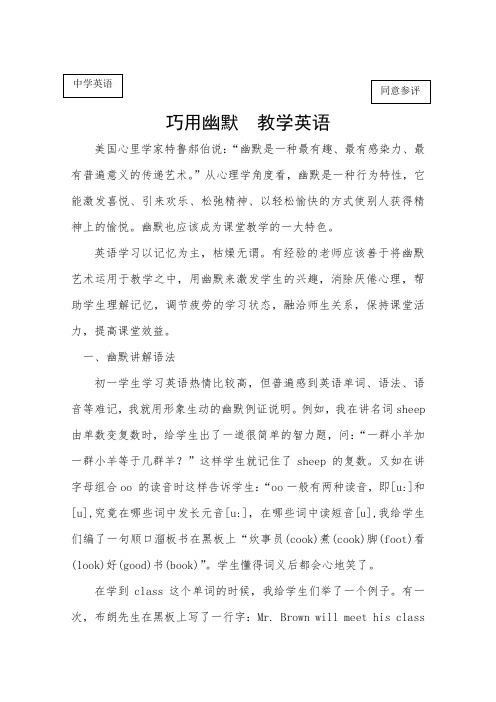
巧用幽默 教学英语美国心里学家特鲁郝伯说:“幽默是一种最有趣、最有感染力、最有普遍意义的传递艺术。
”从心理学角度看,幽默是一种行为特性,它能激发喜悦、引来欢乐、松弛精神、以轻松愉快的方式使别人获得精神上的愉悦。
幽默也应该成为课堂教学的一大特色。
英语学习以记忆为主,枯燥无谓。
有经验的老师应该善于将幽默艺术运用于教学之中,用幽默来激发学生的兴趣,消除厌倦心理,帮助学生理解记忆,调节疲劳的学习状态,融洽师生关系,保持课堂活力,提高课堂效益。
一、幽默讲解语法初一学生学习英语热情比较高,但普遍感到英语单词、语法、语音等难记,我就用形象生动的幽默例证说明。
例如,我在讲名词sheep 由单数变复数时,给学生出了一道很简单的智力题,问:“一群小羊加一群小羊等于几群羊?”这样学生就记住了sheep 的复数。
又如在讲字母组合oo 的读音时这样告诉学生:“oo 一般有两种读音,即[u:]和[u],究竟在哪些词中发长元音[u:],在哪些词中读短音[u],我给学生们编了一句顺口溜板书在黑板上“炊事员(cook)煮(cook)脚(foot)看(look)好(good)书(book)”。
学生懂得词义后都会心地笑了。
在学到class 这个单词的时候,我给学生们举了一个例子。
有一次,布朗先生在黑板上写了一行字:Mr. Brown will meet his classthis evening. 学生与他开玩笑,将class中的c抹去变为lass,“布朗先生要去见他的情侣。
”布朗先生灵机一动,又将“lass”中的L去掉,变成“ass”,意思就变成了“布朗先生要去见他的傻子。
”学生们一听句意都大笑起来。
通过这个例子,我告诉学生们英语是拼音文字,有规律可循,我们可以通过给一个单词增删字母的方式来复习单词、扩大词汇量。
接着就给学生介绍重复记忆法、归纳记忆法、背诵记忆法、效果都很好。
三、幽默讲解句子初一课本上有这样一个句子:What is your father? He is a farmer.(你爸爸是做什么的?他是一个农民。
巧用英语幽默笑话,提高课堂教学质量幽默笑话
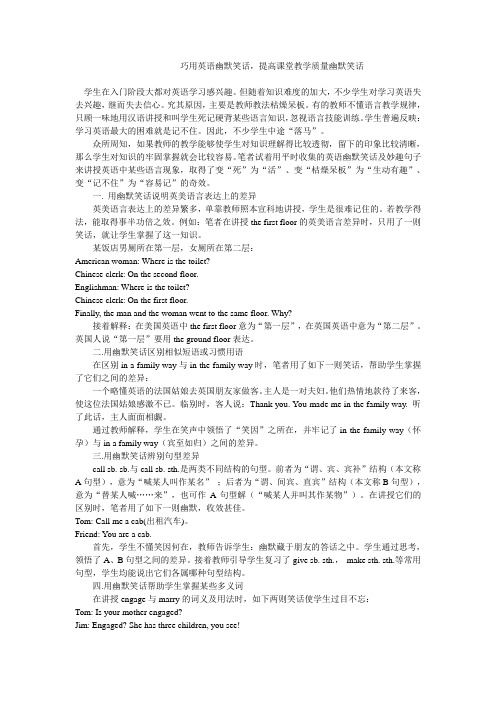
巧用英语幽默笑话,提高课堂教学质量幽默笑话学生在入门阶段大都对英语学习感兴趣。
但随着知识难度的加大,不少学生对学习英语失去兴趣,继而失去信心。
究其原因,主要是教师教法枯燥呆板。
有的教师不懂语言教学规律,只顾一味地用汉语讲授和叫学生死记硬背某些语言知识,忽视语言技能训练。
学生普遍反映:学习英语最大的困难就是记不住。
因此,不少学生中途“落马”。
众所周知,如果教师的教学能够使学生对知识理解得比较透彻,留下的印象比较清晰,那么学生对知识的牢固掌握就会比较容易。
笔者试着用平时收集的英语幽默笑话及妙趣句子来讲授英语中某些语言现象,取得了变“死”为“活”、变“枯燥呆板”为“生动有趣”、变“记不住”为“容易记”的奇效。
一. 用幽默笑话说明英美语言表达上的差异英美语言表达上的差异繁多,单靠教师照本宣科地讲授,学生是很难记住的。
若教学得法,能取得事半功倍之效。
例如:笔者在讲授the first floor的英美语言差异时,只用了一则笑话,就让学生掌握了这一知识。
某饭店男厕所在第一层,女厕所在第二层:American woman: Where is the toilet?Chinese clerk: On the second floor.Englishman: Where is the toilet?Chinese clerk: On the first floor.Finally, the man and the woman went to the same floor. Why?接着解释:在美国英语中the first floor意为“第一层”,在英国英语中意为“第二层”。
英国人说“第一层”要用the ground floor表达。
二.用幽默笑话区别相似短语或习惯用语在区别in a family way与in the family way时,笔者用了如下一则笑话,帮助学生掌握了它们之间的差异:一个略懂英语的法国姑娘去英国朋友家做客。
英语课堂上的幽默笑话

英语课堂上的幽默笑话英语课堂上的幽默笑话篇1One小明上英文课时跟老师说:May I go to the toilet?老师说:Go ahead.小明就坐了下来。
过了一会儿,小明又跟老师说:May I go to the toilet?老师说:Go ahead.小明又坐了下来。
他旁边的同学于是忍不住问:你不是跟老师说要上厕所吗?怎么不去?小明说:你没听老师说“去你个头”啊!Two某日,小明学习了how to spell it?这一句型。
回家后,妈妈观察他手上的玩具表,问道:妈妈:What’s on your hand?小明:Watch.妈妈:How to spell that?小明:THAT~Three某日,老师教小涛,英语中,姓氏可以放在名字后面。
小明放学后遇到一个外国人,于是他英勇地上去与外国人对话。
小明:How are you? My name is HongTao Liu.外国人:Oh, my god! 我还是方片七呢!Four一日,小明心情有很好,于是他夸赞英语老师美丽。
小明:Miss Jiang, you are very beautiful.老师听后心花怒放,嘴上还要虚心一下:“哪里,哪里”。
小明心想:老师的意思就是“Where? Where?,天哪,还有这样的人,非要追问哪里美丽的,干脆马屁拍究竟:Everywhere, everywhere.老师:……Five小明刻苦学习英语,终有小成。
一日上街不慎与一老外相撞,忙说:I am sorry.老外应道:I am sorry too.小明听后又道:I am sorry three.老外不解,问:What are you sorry for?小明无奈,道:I am sorry five.Six一日,小明上课打磕睡,于是英语老师向小明提问。
老师:小明,How are you是什么意思?小明心想:how是怎么,you 是你,于是回答“怎么是你?”老师很生气,又问:“那How old are you ?是什么意思?”小明心想:old是老的,于是回答怎么老是你?”英语课堂上的幽默笑话篇2心不在焉的老师An Absent Minded ProfessorA notoriously absentminded professor was one day observed walking along the street with one foot continually in the gutter,the other on the pavement.A pupil meeting him said:“Good evening,professor.How are you? “Well,” answered the professor,“I thought I was all right when I left home,but now I dont know whats the matter with me.Ive been limping for the last half hour.”有一天,人们观察一个出名的心不在焉的老师在路上走,他的一只脚始终踏在街沟里,另一只脚踩在人行道上。
如何让英语课堂幽默起来

如何让英语课堂幽默起来英语课堂是学生提高英语能力的重要环境,但有时候学生在学习中会感到乏味和枯燥。
为了激发学生的学习兴趣和提高他们的学习效果,我们可以通过加入幽默元素来使英语课堂更加有趣。
本文将介绍一些方法和技巧,帮助教师让英语课堂变得幽默起来。
一、创造良好的氛围在英语课堂中,创造一个轻松快乐的氛围是非常重要的。
教师可以以幽默的方式问好,使用幽默的方式向学生介绍新课或者复习旧课。
例如,教师可以用有趣的故事、笑话或者趣味横生的例子来引入新的单词或语法知识。
这样不仅能够吸引学生的注意力,还能够让学生在轻松的氛围中学习。
二、利用幽默演绎教学幽默演绎可以是一种很好的教学方式。
教师可以扮演不同的角色,用幽默的方式模拟真实情境,让学生在欢笑中学习。
例如,在教授口语表达时,教师可以扮演不同的角色,模拟真实的对话情境。
通过这种方式,学生可以更好地理解和掌握日常口语表达。
三、使用幽默教学材料教师在选择教学材料时可以注重幽默元素的加入。
例如,选择一些有趣的视频、音频或者图片,引起学生的兴趣。
同时,教师也可以引入一些幽默的故事、笑话、谜语等教学内容,以激发学生的学习兴趣。
通过使用幽默的教学材料,教师可以提高学生的参与度和学习动力。
四、鼓励学生参与互动在英语课堂中,鼓励学生参与互动是非常重要的。
教师可以设计一些具有互动性和趣味性的活动,如小组讨论、角色扮演、游戏等。
同时,教师还可以设置一些小奖励,以激励学生积极参与互动。
通过这种方式,学生不仅能够在活动中感受到快乐和乐趣,还能够提高他们的英语口语表达和交际能力。
五、与学生建立良好的师生关系良好的师生关系是提高课堂幽默的重要基础。
教师可以关心学生的成长和生活,与学生建立亲近和信任的关系。
这样可以让学生在课堂中更加开放和自信,更愿意与教师分享自己的想法和经历。
同时,教师也可以在课堂中以一种幽默的方式与学生互动,增强课堂的活跃性和趣味性。
总之,通过创造良好的氛围、使用幽默教学材料、幽默演绎教学、鼓励学生参与互动和与学生建立良好的师生关系,英语课堂可以变得更加幽默起来。
高中英语幽默笑话故事五篇

高中英语幽默笑话故事五篇有时候阅读一些幽默搞笑的英语故事,除了能让人产生兴趣更能提高英语阅读水平。
以下是小编给大家整理的关于高中英语幽默笑话故事,希望可以帮到大家关于高中英语幽默笑话故事<一>the wolf and the fox wanted to eat the rabbit, but it wasn't easy to catch him.one day the wolf said to the fox, "you go home and lie in bed. i'll tell the rabbitthat you are dead. when he comes to look at you, you can jump up and catch him." that's a good idea," said the fox.he went home at once. the wolf went to the rabbit's house and knocked at the door. "who is it?" asked the rabbit. "it's the wolf. i've come to tell you that the fox is dead." then the wolf went away.the rabbit went to the fox's house. he looked in through the window and saw the fox lying in bed with his eyes closed. he thought, "is the fox really dead or is he pretending to be dead? if he's not dead, he'll catch me when i go near him." so he said, "the wolf says that the fox is dead. but he doesn't look like a dead fox. themouth of a dead fox is always open." when the fox heard this, he thought, "i'll show him that i'm dead." so he opened his mouth.the rabbit knew that the fox wasn't dead, and he ran as quickly as he could.狼和狐狸想要吃掉兔子,但是这只兔子太难抓到了。
英语高中说课搞笑教案模板
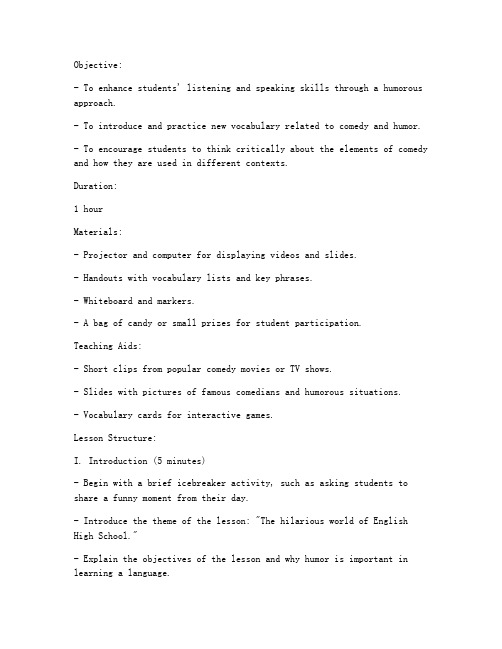
Objective:- To enhance students' listening and speaking skills through a humorous approach.- To introduce and practice new vocabulary related to comedy and humor.- To encourage students to think critically about the elements of comedy and how they are used in different contexts.Duration:1 hourMaterials:- Projector and computer for displaying videos and slides.- Handouts with vocabulary lists and key phrases.- Whiteboard and markers.- A bag of candy or small prizes for student participation.Teaching Aids:- Short clips from popular comedy movies or TV shows.- Slides with pictures of famous comedians and humorous situations.- Vocabulary cards for interactive games.Lesson Structure:I. Introduction (5 minutes)- Begin with a brief icebreaker activity, such as asking students to share a funny moment from their day.- Introduce the theme of the lesson: "The hilarious world of English High School."- Explain the objectives of the lesson and why humor is important in learning a language.II. Warm-up (10 minutes)- Show a short video clip of a comedy scene that is easily understandable by all students.- Pause the video at key moments and ask students to predict what will happen next.- Discuss the humor in the scene and how it was achieved.III. Vocabulary Introduction (15 minutes)- Introduce new vocabulary related to comedy and humor using slides and pictures.- Use interactive games, such as "Simon Says" or "Charades," to practice the new words.- Example vocabulary: joke, pun, slapstick, satire, comedy club, punchline, etc.IV. Main Activity: "Comedy Showdown" (20 minutes)- Divide the class into small groups and assign each group a famous comedian or a type of comedy (e.g., slapstick, stand-up, sketch comedy).- Each group must create a short skit or presentation that showcases the humor of their assigned topic.- Encourage students to use the new vocabulary and to be creative with their performances.- Provide feedback on each group's performance and highlight the use of comedy elements.V. Analysis and Discussion (15 minutes)- Show a longer comedy clip and pause at key points to discuss the humor and the techniques used.- Ask students to identify the different elements of comedy, such as timing, delivery, and situational irony.- Discuss how these elements can be used to create a humorous effect in both English and their native language.VI. Conclusion and Review (10 minutes)- Summarize the key points of the lesson and review the new vocabulary.- Conduct a quick quiz to check for understanding of the new words.- Ask students to reflect on what they have learned about humor and how it can be used in their own lives.VII. Homework Assignment- Assign students to watch a short comedy sketch or stand-up routine at home and write a brief analysis of the humor techniques used.- Encourage them to think about how they can incorporate humor into their own writing or speaking.Assessment:- Observe student participation and engagement throughout the lesson.- Evaluate the quality of the skits and presentations in the "Comedy Showdown" activity.- Assess the students' understanding of the new vocabulary through the quick quiz and homework assignment.Note:- Ensure that all activities are inclusive and that students feel comfortable participating in the humorous aspects of the lesson.- Be prepared to adapt the lesson plan based on the students' reactions and engagement levels.- Remember to have fun and enjoy the process of teaching humor in English!。
老师幽默搞笑讲课作文英语

老师幽默搞笑讲课作文英语As a teacher, I always believe that humor is an essential tool in the classroom. It not only helps to create a relaxed and enjoyable learning environment, but it also makes the learning process more effective and memorable for students. Therefore, I always try to incorporate humor and fun into my lessons to engage my students and make the learning experience more enjoyablefor them.One of the ways I use humor in my teaching is through funny anecdotes and stories. I often start my lessons with a funny story or joke to grab my students' attention and put them in a good mood. For example, I once told my students about a hilarious incident that happened to me when I was a student, and they couldn't stop laughing. This not only helped to break the ice and create a positive atmosphere in the classroom, but it also made the lesson more relatable and memorable for my students.In addition to using funny stories and jokes, I also like to use humor to explain difficult concepts and make them more understandable for my students. I find that using humor to explain complex ideas not only makes the learning process more enjoyable for students, but it also helps them to better understand and remember the information. For example, when I was teaching my students about the laws of physics, I used a funny analogy involving a clumsyscientist and a series of comical experiments to help my students grasp the concept of gravity. This not only made the lesson more entertaining for my students, but it also helped them to understand the concept more easily.Furthermore, I also like to use humor to lighten the mood and defuse tense situations in the classroom. For example, when my students are feeling stressed or overwhelmed by a difficult assignment, I often crack a joke or tell a funny story to help them relax and refocus. This not only helps to reduce their anxiety and improve their mood, but it also creates a more positive and supportive learning environment in the classroom.Overall, I believe that humor is a powerful tool in teaching, and I always try to incorporate it into my lessons to make the learning experience more enjoyable and effective for my students. By using funny anecdotes and stories, using humor to explain difficult concepts, and using humor to lighten the mood in the classroom, I am able to create a positive and engaging learning environment that helps my students to learn and grow. I truly believe that a little bit of humor goes a long way in the classroom, and I will continue to use it in my teaching to create a fun and memorable learning experience for my students.。
幽默在中学英语教学中应用论文

幽默在中学英语教学中的应用教学是一门艺术,前苏联教育家马卡连柯说过:”同样的教学方法,因为语言不同,就可能相差二十倍”。
语言是用来反映生活以及表达思想感情的一种途径。
语言来自于生活同时又运用于生活。
由此观之,语言的生活化和动感化是不容置疑的。
幽默是语言的装饰品、调味品,是美的化身,是睿智的同义词,缺少幽默的语言如一潭死水。
所以,幽默化也应该是有血有肉的语言的不可或缺的一个要素。
前苏联教育家斯维特洛夫认为:”教育最主要的也是第一位的助手就是幽默”。
教学幽默在课堂的运用是教师个性智慧的闪烁,是寓教于乐的机智。
英语教师,作为语言的传播者和传授者,其职责之一就是运用幽默的语言艺术向学生展现英语语言的机智风趣及其中所蕴涵的文化,使学生领略到英语作为一门语言的无穷魅力,从而提高学生英语学习的积极性和主动性,因此,英语老师要学会挖掘自身的幽默细胞,不时幽他一默。
什么是幽默语言艺术,在英语教学中如何运用幽默语言艺术及运用的原则是本文讨论的中心问题。
一、什么是幽默语言艺术“幽默”一词来自英语humour的音译。
词典上的解释是the quality of being amusing。
英语humor刚传入我国时,曾有人用汉语意思与之相近的”滑稽”“诙谐”等词翻译它。
幽默语言艺术是一种以语言为建构材料,以智慧和理性为内核,以美的形式为外观表现,以契机为催化剂的艺术表达形式。
教学语言幽默艺术是指将语言幽默运用于教学,并以其独特的艺术魅力,在学生会心的微笑中提高教学艺术效果和水平的活动。
二、幽默的语言艺术在英语教学中的应用根据美国一位博士所征集的九万多封学生(其中包括成人学生)的信,归纳出教师应该具备的素质,其中的一项就是教师语言要有幽默感,这就表明学生无论年纪和学习阶段都喜欢具有幽默感的教师。
”我国著名英语教授陆谷孙说过,”老师不是喜剧演员,但有一点幽默感,对教学然是有益的。
”新课标指出,英语教学要积极创造贴近学生实际生活的教学活动,吸引和组织学生积极参与,让学生真正”动”起来,做到”在学中用,在用中学,活学活用。
高中英语教学中的幽默因素运用
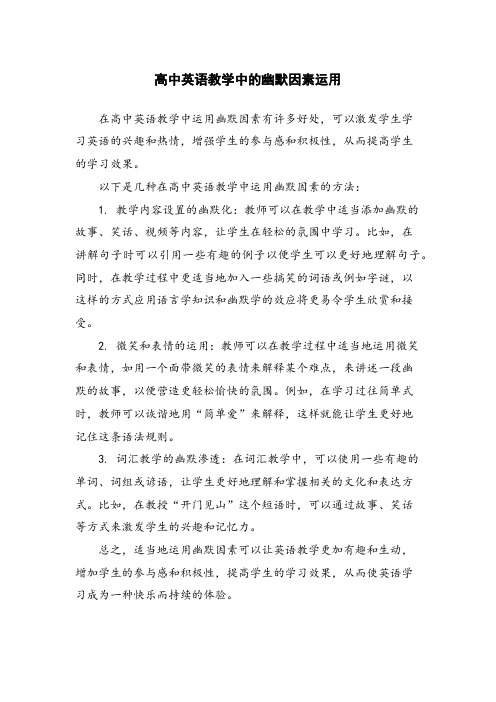
高中英语教学中的幽默因素运用
在高中英语教学中运用幽默因素有许多好处,可以激发学生学
习英语的兴趣和热情,增强学生的参与感和积极性,从而提高学生
的学习效果。
以下是几种在高中英语教学中运用幽默因素的方法:
1. 教学内容设置的幽默化:教师可以在教学中适当添加幽默的
故事、笑话、视频等内容,让学生在轻松的氛围中学习。
比如,在
讲解句子时可以引用一些有趣的例子以便学生可以更好地理解句子。
同时,在教学过程中更适当地加入一些搞笑的词语或例如字谜,以
这样的方式应用语言学知识和幽默学的效应将更易令学生欣赏和接受。
2. 微笑和表情的运用:教师可以在教学过程中适当地运用微笑
和表情,如用一个面带微笑的表情来解释某个难点,来讲述一段幽
默的故事,以便营造更轻松愉快的氛围。
例如,在学习过往简单式时,教师可以诙谐地用“简单爱”来解释,这样就能让学生更好地
记住这条语法规则。
3. 词汇教学的幽默渗透:在词汇教学中,可以使用一些有趣的
单词、词组或谚语,让学生更好地理解和掌握相关的文化和表达方式。
比如,在教授“开门见山”这个短语时,可以通过故事、笑话
等方式来激发学生的兴趣和记忆力。
总之,适当地运用幽默因素可以让英语教学更加有趣和生动,
增加学生的参与感和积极性,提高学生的学习效果,从而使英语学
习成为一种快乐而持续的体验。
小标题《上课幽默》作文

小标题《上课幽默》作文英文回答:In my opinion, humor in the classroom can have a positive impact on both students and teachers. Firstly, humor can help create a relaxed and enjoyable learning atmosphere. When the teacher uses humor, it lightens the mood and makes the classroom a more comfortable place for students. This can lead to increased engagement and participation in class activities.Secondly, humor can enhance the learning experience. When teachers incorporate humor into their lessons, it can help students remember and understand the material better. For example, a teacher can use a funny anecdote or a humorous video to illustrate a difficult concept. This not only grabs students' attention but also helps them to retain the information more effectively.Furthermore, humor can foster a sense of camaraderieamong students. When students laugh together, it creates a bond and promotes a positive classroom environment. This can encourage collaboration and teamwork among students, as they feel more comfortable interacting with each other.Lastly, humor can also be used as a tool for classroom management. A well-timed joke or a funny remark can help diffuse tension or redirect students' attention when they are off-task. It can also help to establish a positive relationship between the teacher and the students, making disciplinary actions more effective and less confrontational.中文回答:在我看来,课堂幽默对学生和教师都有积极的影响。
高中英语小笑话大全爆笑
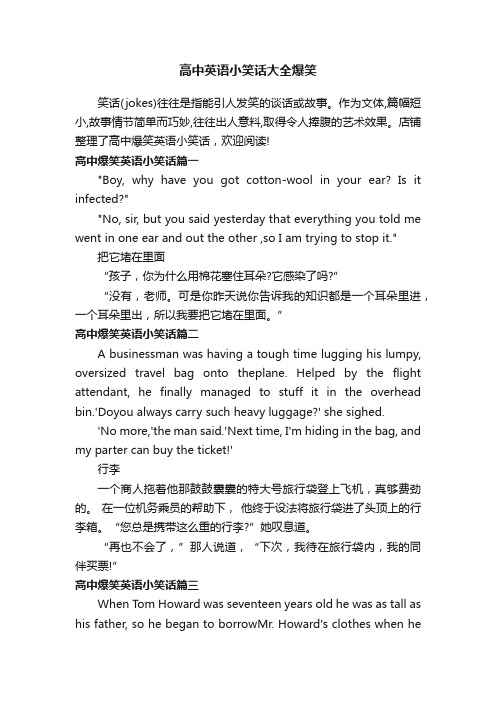
高中英语小笑话大全爆笑笑话(jokes)往往是指能引人发笑的谈话或故事。
作为文体,篇幅短小,故事情节简单而巧妙,往往出人意料,取得令人捧腹的艺术效果。
店铺整理了高中爆笑英语小笑话,欢迎阅读!高中爆笑英语小笑话篇一"Boy, why have you got cotton-wool in your ear? Is it infected?""No, sir, but you said yesterday that everything you told me went in one ear and out the other ,so I am trying to stop it."把它堵在里面“孩子,你为什么用棉花塞住耳朵?它感染了吗?”“没有,老师。
可是你昨天说你告诉我的知识都是一个耳朵里进,一个耳朵里出,所以我要把它堵在里面。
”高中爆笑英语小笑话篇二A businessman was having a tough time lugging his lumpy, oversized travel bag onto theplane. Helped by the flight attendant, he finally managed to stuff it in the overhead bin.'Doyou always carry such heavy luggage?' she sighed.'No more,'the man said.'Next time, I'm hiding in the bag, and my parter can buy the ticket!'行李一个商人拖着他那鼓鼓囊囊的特大号旅行袋登上飞机,真够费劲的。
在一位机务乘员的帮助下,他终于设法将旅行袋进了头顶上的行李箱。
在英语教学中如何使用幽默

在英语教学中如何使用幽默作者:王呈军来源:《河南教育·基教版》2024年第08期在当代教育实践中,幽默已成为一种重要的教学工具,特别是在语言学习这一领域。
在课堂上,幽默的有效使用,不仅能引起学生的注意,激发学生的学习积极性,还能减轻学生的学业压力,提升他们对新知识的理解和吸收能力。
本文结合语言习得原则,探讨教育中幽默的运用,以及教师在寓教于乐中应承担的职责与采用的策略。
一、理论背景第二语言习得理论和学习动机理论是理解语言学习过程中不可或缺的两个重要理念。
第二语言习得理论主要关注和解释学习者如何掌握第二种语言的过程,它包括不同的理论观点,如行为主义、生成语法理论和交际语言教学。
这些理论从不同角度解释语言学习过程,覆盖语法、词汇、语用等多个层面的学习过程。
特别是在交际能力的培养方面,第二语言习得理论强调语言使用的真实情境和交际实践的重要性。
学习动机理论主要研究个人学习的内在与外在推动因素。
动力被视为提高语言技能的核心要素,特别是在非母语的环境下。
根据该理论,动力可能源自个人对语言学习的内在兴趣,比如对不同文化的热爱或追求自我实现,或是外部因素,比如考试压力或职业发展目标。
学习动机理论强调在学习语言的过程中,个人的学习态度和习惯可能决定了他们的学习效果。
结合上述两种理论,我们可以更全面地理解语言学习的复杂性。
有效的语言教学需要考虑两个方面,既要提供合适的语言输入和实践机会,又要激发和维持学习者的学习动机。
在实际应用中,教师可以根据这些理论来设计课程和活动,在提高学生语言能力的同时,也要关注他们的学习动机和态度,从而促进第二语言更有效的习得。
幽默与学习动机之间的联系是教学领域的研究热点。
从理论的角度来看,幽默被认为是一种有效的教学工具,它能够营造积极的学习环境和提升学生的参与度。
依据心理学和教育学理论,幽默能够降低学习过程中的焦虑感,增强记忆力,并提升信息处理的效率。
例如,根据马斯洛的需求层次理论,幽默可以满足学生的归属感和自尊需求,从而激发他们的内在学习动机。
让英语教学幽默起来

让英语教学幽默起来教学幽默是一种教学艺术,是教师个性和智慧的激情碰撞,巧妙运用于课堂气氛的调节、知识的传授和学风的激励,实现教学产出的最大化,推动素质教育的可持续发展,促进学生身心得到健康发展。
本文以具体事例重点阐述了英语教学中幽默的作用,并对教学幽默运用时要把握的庄、谐、时、事、度几个方面进行了反思。
标签:教学幽默;作用;运用;反思。
中学英语课堂在近几年教学改革中出现了很大的变化,由应试教育逐渐转变为素质教育。
在传统的教学模式下,教师是学生的”大总管”,总揽一切--制定教学计划,确定教学目的,安排教学内容,选择教学方法以及主持教学效果评价。
学生学什么、怎么学、如何评定,都在其主导之下,学生处于被动消极的状态,难以发挥主体性和主观能动性,自然也就逐渐地丧失了对英语学习的兴趣和恒心。
正如苏联教学论专家斯卡特金所指出的,”我们建立起了很合理的、很有逻辑性的教学过程,但它给积极情感的食粮很少,因而引起很多学生的苦恼、恐惧和别的消极感受,阻止他们全力以赴地去学习”(中学教学论,1982)。
而当今社会的教育是”以人为本”的教育,以学生为中心和主体,体现的是人的价值,让学生在教育教学活动中和谐发展,培养学生的思维能力、实践能力、创新能力,适应现代可持续发展战略的需要。
因此,教师必须要服从教学的需要,把学生的”乐学”和教师的”乐教”两者有机地结合起来,让”乐学”与”乐教”相辅相成、相得益彰。
所以,广大英语教师要想增强教学效果,激发学生更大的兴趣和热情,就应充分利用”幽默”--这一成功者的利器。
一、幽默的含义“幽默”是个外来语,是英语”humor”的音译,牛津高阶英汉双解词典解释为the quality in sth. that makes it funny or amusing; the ability to laugh at things that are amusing;《现代汉语词典》中解释为:”通过影射、讽刺、双关修辞等手法,在善意的微笑中,揭露生活中乖讹和不通情理之处。
高中英语教师幽默工作总结

高中英语教师幽默工作总结
教学生活中的快乐点滴
这一学期的英语教学工作过得真是快乐又充实。
作为一名高中英语教师,我深深感受到了幽默的力量和它在教学中的积极影响。
没有比用幽默来打破紧张氛围、增加学生兴趣和帮助他们更好地理解知识更好的方式了。
下面是我在教学中使用幽默的一些经历和总结。
首先,我通常会使用一些幽默的例子或故事来说明抽象的知识点。
比如,当我教授词汇时,我会用一些有趣的故事或场景来帮助学生记住单词。
我发现学生们对这样的故事更感兴趣,记忆效果也更好。
幽默的含义和趣味性帮助学生们更好地理解单词的意思和使用方法。
其次,我会在课堂上使用一些幽默的活动来活跃气氛。
比如,在进行口语练习时,我会让学生们模拟一些有趣的对话场景,让他们在轻松的氛围下自由表达。
引入幽默元素不仅可以让学生们放松身心,还能帮助他们培养英语思维习惯和提高口语表达能力。
最后,我还会在评价作文时使用一些幽默的方式。
写作是学生们较为沉重的任务之一,因此在评价过程中,我常常使用一些幽默的语言来调剂学生的情绪。
通过轻松的评价方式,我能够减轻学生们的压力,让他们更加愉快地面对写作和评价。
总的来说,幽默是我教学生活中的秘密武器。
它不仅能够改善
课堂氛围,增加学生的兴趣,还能帮助他们更好地理解和掌握知识。
我会继续在教学中运用幽默,创造更愉快的学习环境,激发学生的学习热情。
英语口语幽默小故事

英语口语幽默小故事故事教学法是指在教学过程中,通过故事教学来完成教学和达到教学目标的一种教学方法,具有一定的现实性与可行性。
店铺整理了英语口语幽默小故事,欢迎阅读!英语口语幽默小故事篇一At Least You Get a Choice至少你有所选择A newly deceased sinner had just entered hell, and was being shown around.一名罪人去世后,刚下地狱就被带往各处走走。
"I'll tell you how it works around here," declared a particularly hideous devil. "You get your choice of three punishments. Here's the first. "“我将告诉你这里的状况,”一位面目可憎的魔鬼宣布道。
“你必须在三种刑罚中选一个,这是第一种。
”The sinner watched in horror as he saw men and women repeatedly being immersed in boiling water.罪人看见男男女女反复地被浸入沸腾的热水中,吓得目瞪口呆。
"Here's the second. " The poor sinner shuddered as he saw unfortunate people being continually',event)">continually hounded by ferocious beasts and cruel demons.“再看第二种。
”可怜的罪人看到一些不幸的人被凶恶的野兽和残酷的妖怪不停地追赶,吓得直打哆嗦。
“And here's the third. ” A group was standing knee deep in shit and sipping tea.And he joined the group.“这是第三种。
幽默在高中英语教学中的应用

幽默在高中英语教学中的应用作者:杨靖来源:《中学生英语·教师版》2017年第10期相较于初中英语学习,高中英语不仅涉及到大量的词汇,也需要学生掌握比较多的语法结构,因而学生学习的难度较大。
高中英语教师如果采用知识灌输式授课模式,很容易使学生产生抵触情绪,学习兴趣不高。
如果高中英语教师可以引入幽默教学理念,那么就可以有效地激发学生学习兴趣。
因此,如何在高中英语教学中引入幽默教学理念值得深入探究。
1. 更新教学理念,提升幽默素质随着课程改革的推进,传统高中英语的“填鸭式”教学模式已经极大地束缚了学生学习的自主性和能动性,使学生对于高中英语知识学习缺乏热情和兴趣,影响了学生学习效果。
究其根本原因,主要在于高中教师缺乏教学幽默性,不懂变通,只是一味地按照传统教学方法来开展课堂授课。
为了彻底转变传统英语教学模式的不足,高中英语教师可以充分引入幽默教学模式来改进英语教学流程,以充分发挥幽默教学在提升高中英语教学有效性方面的积极作用。
但是为了确保幽默教学的顺利开展,必须要先提升高中英语教师自身的幽默素质,使学生可以充分感受到来对教师的亲切感,确保学生充分信任教师,逐步拉近师生间的距离。
如果高中英语教师文化素养偏低,同样业无法借助幽默学习模式来传达相关的高中英语教学内容。
因此,为了更好地开展阅读教学,必须要注重培养和提升教师的幽默素质,其具体表现在以下几点:其一,要具备敏锐的观察力,能及时发现和了解学生在学习期间的各种情绪活动;其二,要具备良好的控场力,可以冷静处理教学期间的各种突发状况;其三,要有幽默的心态,可以始终保持积极、乐观的心理。
例如,在讲解《Nelson Mandela》这篇文章的时候,针对种族歧视的介绍,英语教师可以改变传统单独介绍阅读核心思想的学习模式,通过引导学生阅读《You came to me when I was born》这篇小诗,借助这个同传统诗歌不同形式的诗歌形式来启发学生,使学生可以在轰然大笑之后深刻领悟该首诗的具体含义,这样可以大大增强教学效果。
英语作文幽默方法高中

英语作文幽默方法高中Humor is a great way to make people laugh and feel happy. It can be used to lighten the mood and makedifficult situations more bearable. As a high school student, there are many ways to inject humor into our daily lives. In this essay, I will explore some of the methods of humor that can be used in high school.Firstly, one of the easiest ways to inject humor into our daily lives is through our sense of humor. Everyone has a different sense of humor, and what one person finds funny, another might not. However, there are some types of humor that are universally funny, such as puns and wordplay. For example, a classic high school joke might be "Why did the math book look sad? Because it had too many problems."Another way to inject humor into our daily lives is through pranks. Pranks can be harmless and funny, but it's important to make sure that no one is hurt or offended by them. For example, a classic high school prank might be toswitch the contents of two teachers' classrooms, or to fill a locker with balloons.Additionally, humor can be used to diffuse tense situations. When tensions run high, a well-timed joke or humorous comment can help to ease the tension and make everyone feel more relaxed. For example, if there is a heated debate in class, a student might make a joke to lighten the mood and make everyone feel more comfortable.Finally, humor can be used to connect with others. Sharing a funny story or joke can help to break the ice and start a conversation. This can be especially helpful for students who are new to a school or who have trouble making friends. By sharing a humorous moment, students can find common ground and build relationships.In conclusion, there are many ways to inject humor into our daily lives as high school students. Whether it's through our sense of humor, pranks, diffusing tense situations, or connecting with others, humor is animportant part of our lives. So go ahead, tell a joke, share a funny story, and make someone laugh today!。
如何培养幽默感英语作文高中
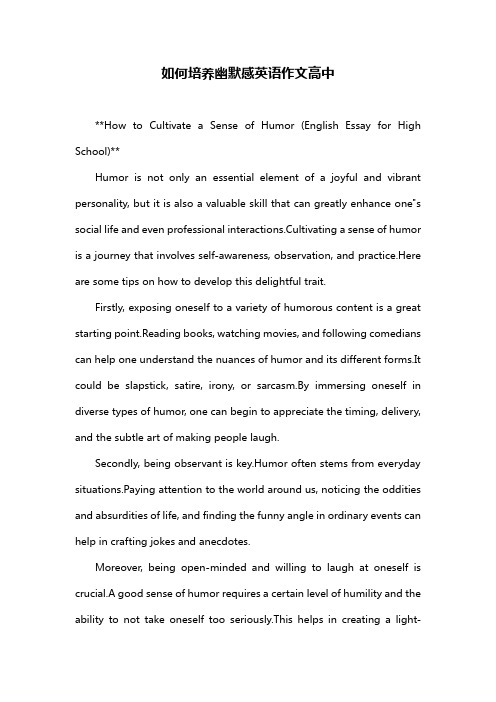
如何培养幽默感英语作文高中**How to Cultivate a Sense of Humor (English Essay for High School)**Humor is not only an essential element of a joyful and vibrant personality, but it is also a valuable skill that can greatly enhance one"s social life and even professional interactions.Cultivating a sense of humor is a journey that involves self-awareness, observation, and practice.Here are some tips on how to develop this delightful trait.Firstly, exposing oneself to a variety of humorous content is a great starting point.Reading books, watching movies, and following comedians can help one understand the nuances of humor and its different forms.It could be slapstick, satire, irony, or sarcasm.By immersing oneself in diverse types of humor, one can begin to appreciate the timing, delivery, and the subtle art of making people laugh.Secondly, being observant is key.Humor often stems from everyday situations.Paying attention to the world around us, noticing the oddities and absurdities of life, and finding the funny angle in ordinary events can help in crafting jokes and anecdotes.Moreover, being open-minded and willing to laugh at oneself is crucial.A good sense of humor requires a certain level of humility and the ability to not take oneself too seriously.This helps in creating a light-hearted atmosphere and makes others feel at ease.Practicing the art of storytelling is also beneficial.Many humorous situations are based on relatable stories well-told.Working on delivery, timing, and narrative structure can make one’s jokes or stories more effective and engaging.Lastly, surrounding oneself with positive people who appreciate and encourage humor can foster its growth.Positive reinforcement and a supportive environment allow for experimentation and improvement.In conclusion, a sense of humor is a skill that can be cultivated with exposure, practice, and the right mindset.It is a valuable asset that can brighten not only one’s own life but also the lives of those around.**如何培养幽默感(高中英语作文)**幽默感不仅是一个充满喜悦和活力个性的重要元素,而且它还是一个能够极大提升个人社交甚至职业交往的有价值技能。
- 1、下载文档前请自行甄别文档内容的完整性,平台不提供额外的编辑、内容补充、找答案等附加服务。
- 2、"仅部分预览"的文档,不可在线预览部分如存在完整性等问题,可反馈申请退款(可完整预览的文档不适用该条件!)。
- 3、如文档侵犯您的权益,请联系客服反馈,我们会尽快为您处理(人工客服工作时间:9:00-18:30)。
【如何在高中英语教学中进行幽默教学】高中英语幽默小故
事
如何在高中英语教学中进行“幽默”教学
平生乃搞笑之人。
所谓江山易改本性难移,难免在日常教学中幽默一把学生。
有时是为了提高学生兴趣,活跃课堂气氛,有时确实是不经意的流露。
常听见学生小声在下面嘀咕,“Miss Yang 的课真幽默。
”心里不禁有一丝得意。
儿子也正在读高中,对他们幽默的物理和历史老师崇拜得五体投地,赞不绝口。
由此更坚定了我将幽默进行到底的决心和信心。
幽默的语言可以使变得浅显易懂;幽默的语言可以使人精神放松,使课堂气氛和谐。
富有幽默感的老师使学生感到和蔼可亲,非常受学生欢迎。
教师恰当地运用幽默,可以活跃课堂气氛,有助于学生产生愉悦的情绪.较容易地接受知识,电有利于增进师生间的感情。
当幽默营造出一种热烈的气氛时,不但学生乐于听课,而且会发生“共振”效应,老师的水平也能超常发挥。
取得极好的效果。
笔者在平时的英语教学中,深切体会到在教学中恰当地运用幽默,能给教学带来非常良好的效果。
有的学生学习习惯很不好,上课要不忘了带书。
要不忘了带作业,甚至忘了做作业。
有一天我检查作业时,看到个别学生又忘了带作业,
很生气.遂当着全班同学的面说,“有些同学常常忘带两样东西,这也不带和那也不带。
”其他同学哄堂大笑,那儿个同学电面红耳赤地低下了头.以后再不敢忘这忘那的了。
高一新生第一节澡时,除了用英语做自我介绍,互相认识,还要教学生英语的学习方法。
在谈论“How to learn English?”这一话题时,因为开学伊始气氛沉闷,师生之间又互不认识,大家都不愿开口说英语,好不容易一名同学站起来扭扭捏捏地说“We can learn English by playing puller games”我连忙打趣说“Yes,we Can learn two words GameOver”一句话逗得大家哈哈大笑,课堂气氛顿时活跃,同学们开始七嘴八舌的议论起来。
真可谓是一石激起千层浪!例如:在讲单词pide (新娘)时,可以给出其相对的单词pidegroom (新郎),并问学生“怎么区分哪个是新娘哪个是新郎呢?”然后自问自答“当然有房子的是新郎喽。
”(因为新郎pide-groom 中room 的含义之一是房间。
不过,有时新娘也会后悔,何以见得呢?因为最好的男人best man成伴郎了。
”学生们听后定会哄堂大笑,同时也在笑声中记住了这些单词。
另外,我经常改编教学参考书的例句.用学生熟悉的本班同学和电影、体育明星等举例,使幽默形象化,更贴近学生生活。
教学参考书为提供了许多例句,以方便教师的备课。
但例句中的人物、地点、事件对学生来说较为陌生。
如把它们改为学生所熟悉的地点、同学及明星的名字,使其仿佛有其事,会更好地引起学生的注意和兴趣。
是人类生活的一部分,与人类社会和语言文化有着密切的关系。
曾有人说学一门语言相当于学其所包含的文化,由于东西方文化差异甚大.社会习俗、风土人情、历史等各不相同,了解西方文化知识是学习英语不可或缺的条件。
西方人喜欢幽默,追求幽默,就英语语言本身开玩笑,所以欣赏幽默的过程就是我们消化、吸收、掌握西方文化知识的过程。
新课程改革对教师的教学提出了更多更高的要求。
首先,教师应该营造一个温暖和谐、积极向上的班级学习团体。
这种学习氛围有利于学生的学习,激发学生学习热情,有助于学生的自主性与探究性学习。
其次,课堂教学要明确学习重难点,适时提供引导,多样协助学生,让学生自动自发。
这样有利于学生正向发展,体验学习的。
再者,引导学生合作,提高学习效率。
内容仅供参考。
